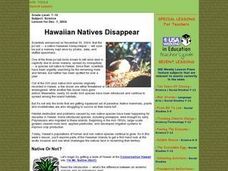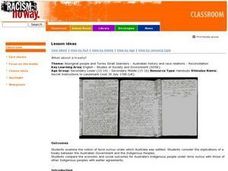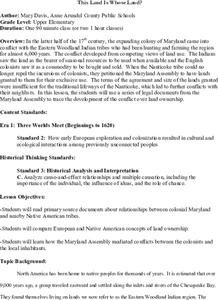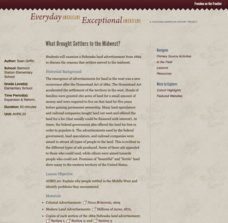Curated OER
Diversity
Eleventh graders research the meaning of diversity and human rights in various countries. In this Social Studies lesson, 11th graders reflect on the aspects that can negatively affect First Nations people, then select a country that has...
DocsTeach
Assimilation of American Indians
Imagine being forced to give up your culture and then being graded on how well you complied with orders to do so. Documents show young historians the price indigenous peoples paid as a result of the Dawes Act, which was essentially a...
K20 LEARN
But What About Me?: Teaching Perspective In The Social Studies Classroom
How would the story of the discovery of America be different if indigenous people told it through their eyes? Individuals compare the conventional account of this moment in history to an account given by one of the native peoples. After...
DocsTeach
Analyzing a Map of the Louisiana Purchase
With the stroke of a pen, Thomas Jefferson roughly doubled the size of the United States. The Louisiana Purchase not only grew the new country, but also it gave rise to the legends surrounding westward expansion and accelerated the...
DocsTeach
Evaluating Perspectives on Westward Expansion
Although popular culture tells the story of the American West simplistically, its reality is far more complex. Native American tribes—while already on the land—didn't have the same interests, and conflicts between white settlers and...
DocsTeach
Before and After Carlisle School
White reformers thought they were "killing the Indian" to "save the man." Native children were taken from their parents and placed at boarding schools, such as the Carlisle School. Using a comparative photo analysis of children before...
Curated OER
Animals of Africa
Students identify animals indigenous to Africa, then create an imaginary animal using various materials they have at home. They write about their animal and include its name, characteristics, and describe how it defends itself.
Curated OER
Alaska Trade
Students spend two days traveling throughout Alaska, trading as they go. They explore universal principles related to trade and commerce while studying about Alaska's geography and indigenous people. At the end of the lesson plan,...
Curated OER
Hawaiian Natives Disappear
Students explore parts of the Hawaiian Islands to get a examine the exotic invasion, and see what challenges the natives face in reclaiming their territory. They identify the changes in the environment that have been the hardest on the...
Curated OER
First Peoples Project
Students participate in this project to connect the indigenous groups of the world. They create a calendar with their artwork with the hope new ideas can be exchanged between groups.
Curated OER
Plate and Planet
Students investigate the health hazards of modern agriculture and how we can choose better food options. In this healthy eating lesson, students identify different indigenous people in photographs and discuss what they might eat....
Curated OER
What is a Treaty?
Students examine the notion of terra nullius, the idea under which Australia was settled. Then they compare the economic and social outcomes for Australia's indigenous people under terra nullius with those of other indigenous peoples...
Curated OER
Mixing Up the Melting Pot
Students examine the cultures of indigenous peoples and how they have or have not assimilated into modern society. They create reports with recommendations on how the Nukak of Columbia could be assimilated into society.
Montana State University
One Mountain, Many Cultures
Americans may think of Mount Everest as a region dedicated to adventurous hikers, but many cultures have flourished there! Learners read informative books, watch videos, participate in classroom discussion, analyze folk tales, and...
Roy Rosenzweig Center for History and New Media
American Indians and their Environment
People could take a page in ingenuity and survival from the Powhatans. Deer skins became clothes, and the members of the Native American group farmed the rich Virginia soil and hunted in its forests for food. Using images of artifacts...
Curated OER
Native Pottery Replicas
Students study ancient Native American traditions and practices. They select one type of Native American pottery to duplicate in a hand-made replica. Afterward, they create a map of the United States and label where indigenous peoples...
Curated OER
Rocky Train Trek
Young scholars research about America's westward movement and the effect of railroads on indigenous peoples, U.S. society, the environment, and the economy. They plan, map, and document an imaginary train journey across North America in...
Curated OER
Plains Indians
Learners design a realistic replica of a Crow or Kiowa circular shield. They examine the material culture of the Plains Indians and the role of shields for the Crow and Kiowa. They study animal symbolism as used by North America's...
Center for History Education
This Land is Whose Land?
Whose land is it, anyway? Young scholars debate the question using primary sources from a case where Maryland indigenous people petitioned for land rights after they lost their original tribal lands. An included chart helps organize...
Core Knowledge Foundation
Native Americans Tell It Again!™ Read-Aloud Anthology
A 154-page anthology explores the life, culture, and history of Native Americans. Eight lessons follow the routine of introducing the reading, conducting the reading, discussing it, doing word work, then taking part in an extension...
Curated OER
That Was Then, This is Now
Learners read about the effect of strict fur trading laws on the lives of the Inuit people in Canada, then use print and digital resources to compare past and present-day ways of life of several indigenous peoples around the world.
Alabama Learning Exchange
Rainforest Music
Fifth graders examine musical instruments used by the indigenous people of the rainforest, and analyze how music is used in their daily lives. They create a model, using natural materials, of a musical instrument used by indigenous...
Curated OER
Food Energy
Learners compare the energy value of traditional foods eaten by indigenous people with those of modern commercial foods. They use a calorimeter to measure and calculate the amount of stored energy in various food types, and identify the...
Roy Rosenzweig Center for History and New Media
What Brought Settlers to the Midwest?
Drawn by promises of fertile land, thousands of settlers poured West because of the Homestead Act of 1862. By examining images of the ads that drew them westward, learners consider the motivations for movement. They also consider how the...

























